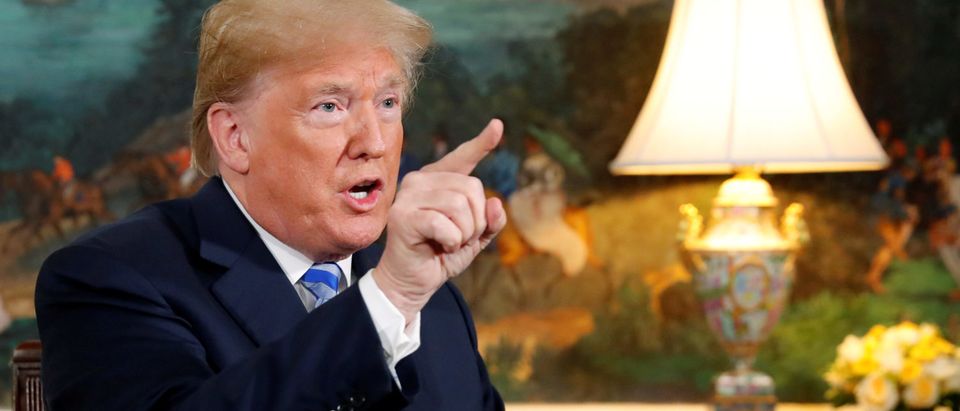President Trump boasts that he’s a skilled negotiator and deal-maker. So far, his self-proclaimed real-estate prowess has not yielded any major diplomatic triumphs. We should wish the president success as he learns how the art of international diplomacy differs from the art of the domestic deal.
Trump is currently confronting seven troublesome regimes: Russia, North Korea, China, Iran, Venezuela, Cuba, and Turkey. The last three pose relatively minor challenges, although it’s worrisome that our NATO ally, Turkey, frequently undermines U.S. positions by flirting with the other six.
A common denominator characterizes these seven regimes: each is led by men whose governing approach is fundamentally totalitarian. Five of these seven nations embrace Marxist-Communist ideology and economics. The remaining two (Iran and Turkey) blend religious fundamentalism and politics. Venezuela will soon collapse with Maduro fleeing to Cuba; Turkey’s economy is sinking; and Cuba will finally evolve once it discovers tourism-led economic growth.
The leaders of Russia, North Korea, China, and Iran also share two other important features: they have each announced unapologetically and clearly their national goals, and in pursuing these goals, they are willing to lie repeatedly. In this respect, they pursue tactics similar to Adolf Hitler’s as he consolidated power before World War II.
Vladimir Putin believes that the 20th century’s biggest disaster was the Soviet Union’s collapse. He dreams of restoring some (all?) of the Soviet Union’s territorial integrity. Absorbing Crimea was the first installment, and there is no reason to doubt that he has similar intentions toward other former Soviet republics where many ethnic Russians live, such as Estonia.
Kim Jong Un is determined to develop nuclear-tipped intercontinental ballistic missiles capable of hitting the United States and Europe. Trump hopes that the allure of South Korea’s vibrant market economy will convince Kim to scrap his nuclear ambitions and adopt capitalism plus democratic pluralism. Kim won’t do this, because a pluralistic society will end his totalitarian rule. Like Hitler, he races to achieve his goals before anyone stops him.
China’s Xi Jinping consolidated power and can now rule for life. He has been forthright about China’s long-term economic strategy, its emerging-market dominance through China’s Belt and Road Initiative, its vast military buildup, and its use of artificial intelligence and surveillance to maintain one-party control, deter dissenters, and identify opponents. Deng Xiaoping’s market- capitalism experiment has not brought democracy to China.
Iran’s leaders want to obliterate Israel. Their vision resembles Hitler’s. Their nuclear-power ambition supports this agenda, and we can expect Iran’s government to cheat on whatever agreement it signs, because such agreements must always be subordinated to that country’s overarching strategic and geopolitical ambitions.
In confronting dictators, American sometimes appear naïve: as habitual optimists, we often hear what we want to hear. Jimmy Carter thought he could reason with his Soviet counterpart and assumed that his Christian values and human-rights beliefs were compelling to others. Then, one morning, he woke up and discovered the Soviets had invaded Afghanistan. Carter learned the hard way that totalitarian regimes will lie to your face. Like Hitler, they are adept at playing their opponents for gullible fools.
More than a decade ago, while visiting China, I attended an economic conference at a Hainan hotel. During an afternoon session, several government representatives stated that the government would promptly curtail the theft of Western intellectual property. After the session, I crossed the hotel’s lobby to visit the gift shop, where I found countless cheap Chinese knockoffs of mostly European luxury items. The hotel was government-run; if the government was serious about stopping intellectual-property theft, it could have done so that afternoon. Trump faces the identical issue as I write this sentence today.
Donald Trump is reportedly not a great reader. But there’s one book he should read carefully: German historian and journalist Volker Ullrich’s Adolf Hitler biography: “Hitler: Ascent 1889-1939.” Ullrich explains how Hitler acquired power legally and announced in advance his major policy aims: scrap the Versailles Treaty, eliminate Jews, rebuild the Ruhr Valley, annex the Sudetenland, and build Europe’s largest army and air force.
Hitler pursued this agenda while the rest of the world either looked the other way, thought he could be appeased, or didn’t believe he was serious. Hitler appeared conciliatory at first and then presented his faits accomplis.
In negotiating with Mikhail Gorbachev, Ronald Reagan famously said, “Trust, but verify.” Today, Donald Trump faces hostile regimes whose leaders aren’t Gorbachevs. It’s time to flip Reagan’s advice: verify first, trust later.
Charles Kolb served as deputy assistant to the president for domestic policy in the Bush White House from 1990-92.
The views and opinions expressed in this commentary are those of the author and do not reflect the official position of The Daily Caller.


